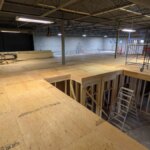I stood outside the freshly painted entrance of what will become Kamloops’ North Shore Health Centre, watching construction crews navigate the site that will soon transform healthcare access for thousands. The June morning sun cast long shadows across the building’s modern facade as project manager Elena Delgado explained the vision behind the facility.
“We’re not just building rooms and hallways,” she told me, gesturing toward the two-story structure. “We’re creating a space that responds to what this community has been asking for – integrated care that treats the whole person.”
Set to open in early 2025, the North Shore Health Centre represents a significant expansion of healthcare infrastructure in the Interior Health region. With capacity to serve approximately 30,000 patient visits annually, the centre aims to address critical healthcare gaps for Kamloops residents, particularly those living in the city’s northern neighborhoods where access has historically been limited.
The $24.3 million facility emerges as British Columbia continues to grapple with healthcare workforce shortages and access challenges that have left nearly one in five residents without a family doctor, according to recent data from the College of Physicians and Surgeons of BC. For North Shore residents like Marianne Teller, the new centre offers tangible hope.
“I’ve been without a family doctor for three years,” Teller shared during a community consultation session I attended last month. “My husband drives me across town for basic care because there’s nothing nearby. Having this centre within walking distance will change everything for seniors like me.”
Interior Health has designed the facility with integrated care as its foundation. Rather than the fragmented approach that has frustrated many patients navigating the healthcare system, the centre will house family physicians, nurse practitioners, mental health professionals, and specialized care services under one roof.
Dr. Raymond Chen, who will join the centre’s team when it opens, believes this model represents healthcare’s future. “The evidence is clear that team-based care leads to better outcomes,” he explained during our conversation at a local café. “When mental health support is just down the hall from your family doctor, and nutritionists can collaborate directly with your care team, we see patients getting better, more comprehensive support.”
Walking through the construction site, Delgado pointed out spaces designated for community education programs, shared consultation rooms designed to facilitate collaborative care, and a layout specifically engineered to create what she calls “healthcare without walls.”
“We’ve incorporated feedback from Indigenous health advocates to ensure cultural safety in the design,” she added, noting carved cedar elements and circular gathering spaces that will facilitate traditional healing practices alongside conventional medicine.
The centre represents part of British Columbia’s broader Primary Care Network strategy, which aims to attach more patients to consistent care providers. According to the Ministry of Health, these networks have connected over 340,000 previously unattached patients with primary care providers since 2018, though significant gaps remain.
For Kamloops Mayor Reid Hamer-Jackson, the timing couldn’t be more critical. “Our population has grown nearly 8% since 2016, but our healthcare infrastructure hasn’t kept pace,” he told me during a phone interview. “The North Shore has particularly felt this strain, with many residents relying on emergency services for routine care.”
The city’s emergency department visits for non-urgent matters increased 12% between 2019 and 2023, according to Interior Health statistics, a trend officials hope the new centre will help reverse.
Community health advocate Teresa Sanderson sees potential beyond just reducing emergency room visits. “This facility creates opportunities for preventive care that simply haven’t existed before,” she explained while showing me a map of existing health services. “When you can get routine screening, mental health support, and chronic disease management in your neighborhood, we’re looking at healthier communities long-term.”
Construction manager Kyle Freeman expects the building to be completed by late December, with services beginning to phase in through the first quarter of 2025. “We’re on schedule and under budget,” he shared with evident pride. “The modular design allowed us to accelerate certain aspects of construction, and we’ve been fortunate with weather and supply chains.”
The centre will initially employ approximately 40 healthcare professionals, with capacity to expand as service demands evolve. Recruitment efforts have already secured commitments from four family physicians, six nurse practitioners, and a team of allied health professionals, according to Interior Health’s workforce planning documents.
Dr. Chen acknowledges the recruitment challenges facing healthcare facilities across Canada but remains optimistic. “Younger physicians are specifically seeking these integrated models,” he said. “They want collaborative environments where they can focus on patient care rather than administration. This centre offers exactly that.”
As the sun climbed higher, casting the building in full light, I watched workers installing energy-efficient windows designed to maximize natural light – a feature research shows improves both patient and provider wellbeing.
“We need to recognize that how we design these spaces directly impacts healing,” explained architect Michelle Tanaka, whose firm specializes in healthcare environments. “Everything from the acoustic properties to the sightlines between waiting areas and green spaces has been considered through a therapeutic lens.”
For North Shore resident James Williams, who has been driving his elderly mother to appointments across town for years, the centre represents more than convenient healthcare – it signifies dignity.
“My mother shouldn’t have to spend her energy just getting to basic care,” he told me. “When you’re dealing with health challenges, proximity is more than convenience – it’s about quality of life.”
As Kamloops continues growing, the North Shore Health Centre stands as both infrastructure investment and community commitment – a recognition that healthcare access remains fundamental to thriving neighborhoods and the individuals who call them home.






